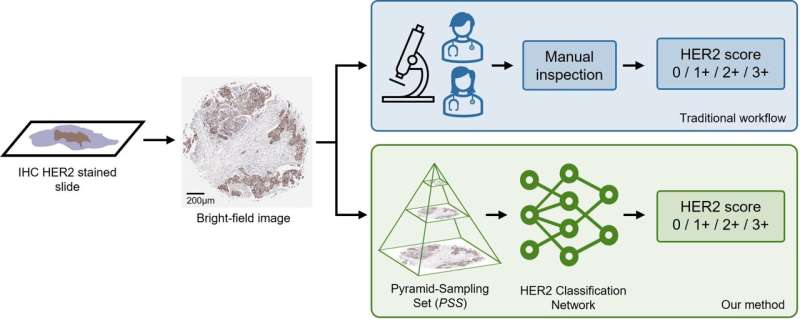This article has been reviewed according to Science X's editorial process and policies. Editors have highlighted the following attributes while ensuring the content's credibility:
fact-checked
trusted source
proofread
Deep learning approach enhances HER2 scoring in breast cancer

The human epidermal growth factor receptor 2 (HER2) is a critical protein in the growth of cancer cells, and its expression level is a vital indicator of breast cancer aggressiveness. Traditionally, HER2 status is assessed manually by pathologists examining immunohistochemically (IHC) stained tissue slides. This manual process, however, is often subject to inter- and intra-observer variability and can be time-consuming, leading to potential delays in diagnosis and treatment planning.
A research team, led by Professor Aydogan Ozcan of UCLA, has developed an automated system using deep learning to analyze morphological features at various spatial scales.
This system addresses the tissue heterogeneity of HER2 expression, providing a comprehensive view and achieving a high HER2 score classification accuracy of 84.70% on a dataset of 523 core images from tissue microarrays.
How it works
The deep learning model introduced by the researchers utilizes a pyramid sampling strategy, which captures and integrates patches of varying scales from high-resolution images into a Pyramid-Sampling Set (PSS). This multi-scale approach ensures a detailed examination of both cellular features and broader tissue architecture, enhancing the accuracy of HER2 status classification.
During the training phase, the model was trained on 1,462 core images from 823 patients, with an additional set of 162 cores from 149 patients used for validation. The efficacy of the model was blindly evaluated using a set of 523 core images from 300 patients that were not previously seen during the training or validation phases.
The study, published in BME Frontiers, involved five board-certified pathologists to independently score the cores, ensuring robust dataset labeling and minimizing the risk of relying on possibly inaccurate patient records due to tissue heterogeneity.
Significant advancements and clinical implications
This automated system has the potential to revolutionize the assessment of HER2 status in clinical settings. By providing a reliable adjunct tool for pathologists, it can enhance diagnostic precision, reduce turnaround times, and ultimately improve patient outcomes.
The automated approach standardizes HER2 assessment and streamlines the pathologists' workflow, making it especially valuable in resource-constrained areas where expert breast pathologists may be limited.
The research team acknowledges that while the model demonstrated a high accuracy of 84.70%, further work is needed to enhance its robustness and generalizability to external datasets. Future studies will explore incorporating color normalization and other enhancement techniques to ensure consistent performance across diverse imaging and staining conditions.
This study marks a significant milestone in breast cancer diagnostics, paving the way for more nuanced, faster, and more accessible diagnostic tools.
The integration of deep learning and pyramid sampling in HER2 scoring not only enhances the accuracy and reliability of breast cancer diagnostics but also contributes to the advancement of personalized medicine, ultimately improving patient care in oncology.
More information: Sahan Yoruc Selcuk et al, Automated HER2 Scoring in Breast Cancer Images Using Deep Learning and Pyramid Sampling, BME Frontiers (2024). DOI: 10.34133/bmef.0048




















